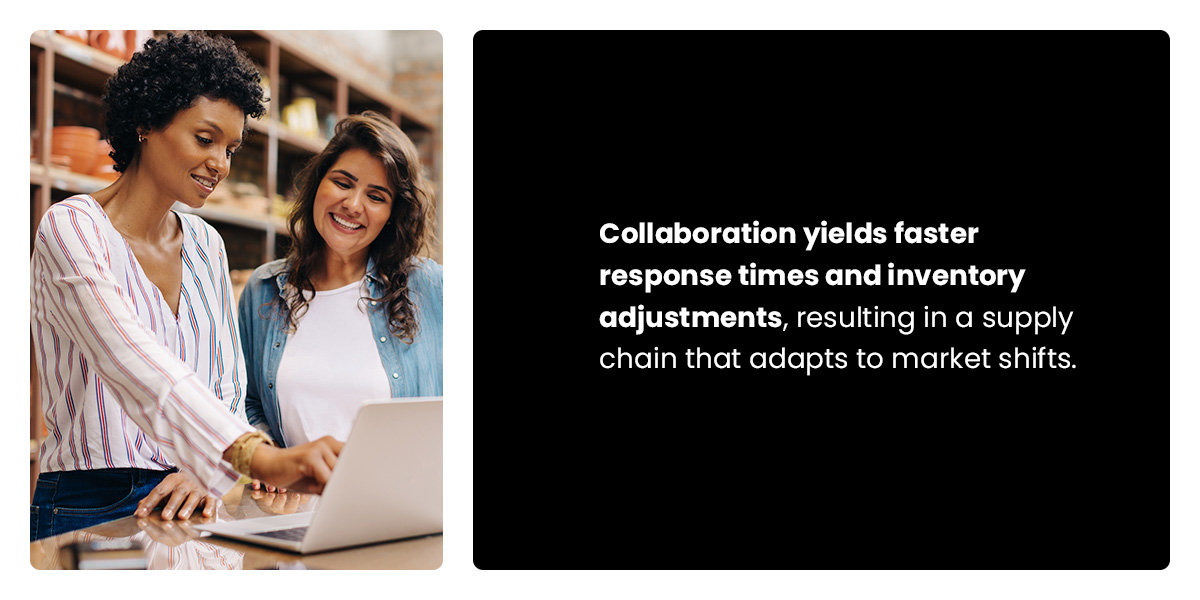
Vendor managed inventory (VMI) is a game-changer redefining the rules of e-commerce. VMI is a supply chain strategy involving the supplier taking a more active role in managing a customer's inventory levels. The supplier checks the customer's stock levels, predicts demand, and refills the inventory as required. VMI seeks to collaborate resulting in reduced supply chain costs, enhanced inventory accuracy and a simplified process.
VMI relies on real-time data sharing, enabling suppliers to respond to demand fluctuations. Suppliers use a vendor managed inventory supply chain to increase efficiency. It also helps to avoid stockouts and strengthen integration between supply chain partners.
What Is Vendor Managed Inventory?
VMI is a strategic approach that simplifies inventory management for online stores. Foresee your inventory needs and keep your virtual shelves stocked with what customers want. Here are a few key elements defining VMI:
Simplified Efficiency
Visualize VMI as a vigilant guardian of your inventory health. VMI monitors the stock levels in your digital store, like how you track your bank account balance. As products approach depletion, it triggers your suppliers to take action for replenishment. A foresight-driven system reducing the chance of stockouts and decreases the need for last-minute rush orders.
Supply Chain Strategy Defined
Your suppliers become dynamic collaborators in your VMI inventory strategy. They analyze data, decode market trends, and use their expertise to predict what products customers want. Market fluctuations adjust inventory levels, not orders.
Collaborative Visibility
The core of VMI thrives on the exchange of insights and information. You create a precise understanding of your business's flow by sharing your sales data with your suppliers. Empowered by this knowledge, your suppliers fine-tune their production and delivery schedules. You can just stock the necessary items on your virtual shelves to serve customers at the point of sale.
Smart Inventory Management
The inventory shortages and excess stock are no longer a problem with VMI. At its core, VMI is an intelligent system powered by data. It delves into historical sales data while also keeping a finger on the pulse of current market trends. VMI forecasts which products will be in high demand with impressive accuracy. It also ensures you have enough stock when it predicts a product will be in high demand. The result? Satisfied customers and a financial resource pool that's managed.
No More Excess
Dealing with surplus inventory gathering dust becomes a thing of the past with VMI. It advises you on the best inventory quantities for maximum efficiency. Understanding the operational excellence that drives a VMI system can help better understand its efficiency. Gaining insight into the nuances of the system can also be beneficial. The force streamlines supply chains to ensure your online store displays the correct products at the right time.
Supplier Success
VMI transforms the old ordering method by letting suppliers suggest orders for distributors. By using info from both sides, this method betters supply chains. VMI insights help suppliers tackle supply-demand issues, meet customers, stay competitive, and keep profits. A helpful VMI feature is item sorting, focusing on fast sellers while keeping a good mix of slower ones for a varied product range. This boosts performance.
How Does a VMI System Work?

Unveiling the operational excellence that drives the efficiency of a VMI system helps to understand its intricacies. Here are the practical aspects that matter to your e-commerce business:
Streamlined Inventory Tracking: A meticulous inventory tracking system is at the heart of VMI. This process involves the seamless exchange of data between you and your suppliers. VMI monitors your digital store's stock levels as you check your bank account balance. Constant real-time monitoring keeps you updated on your inventory status whenever needed. Think of it as having a virtual inventory assistant. This tool offers current insights, helping you make well-informed decisions.
Supplier Access to Data: A key factor that sets VMI apart is the collaborative nature of data sharing. You give your suppliers access to data on your customers' preferences and buying habits. This equips them with the knowledge to predict which products will be successful and which need a boost. This understanding forms the basis. It ensures your virtual shelves contain products that meet your customers' needs.
Automated Ordering: Picture a popular product flying off your digital shelves and nearing its pre-defined low stock threshold. This is where VMI takes the lead with its automated ordering process. VMI triggers replenishment orders like an autopilot system adjusts a plane's flight path. The system triggers when your inventory levels reach certain points. This ensures that your stock remains within the ideal range. The automation streamlines your operations and ensures you're always well-prepared to meet customer demands.
Customer Benefits: VMI takes care of inventory logistics. This allows you to focus on expanding your business and providing customer services. Have your suppliers handle inventory management. This will allow you to focus on sales and customers. VMI is like having a seasoned backstage crew to ensure everything runs smoothly — it can manage the inventory logistics for you and free up your energy to focus on satisfying customers and driving growth.
Risk Reduction: VMI is a powerful risk reduction tool within your inventory management toolkit. VMI analyzes historical sales data and market trends. This allows them to expect demand patterns and prevent stockouts and overstocking. Using real-time inventory tracking, VMI helps to avoid excess inventory. Supplier insights, automated ordering, and risk management create a more efficient system. Let's now explore the tangible benefits of VMI for e-commerce ventures.
10 Benefits of Vendor Managed Inventory
Venturing into vendor managed inventory isn't about numbers. It's about unlocking a set of practical advantages. These advantages can reshape how you navigate your online business. Here are some tangible benefits of VMI that streamline operations and please customers:
1. Reliable Inventory Levels
One of the most noteworthy benefits of VMI is its knack for maintaining dependable inventory levels. VMI's supplier and data-driven approach allows customers to find the products on your virtual shelves. What a great benefit for your business! Thanks to VMI's data-driven approach, you can bid farewell to the anxiety of running out of stock. Proactive supplier involvement also helps you to meet last-minute orders. This reliability builds trust, making you a go-to source for your customers.
2. Cost Savings
Efficiency often translates into cost savings, and VMI is a prime example. By optimizing inventory levels, you bypass the financial strain of excess stock and stockouts. VMI's data-driven mechanism ensures that insights ground inventory decisions. This prevents an unnecessary surplus and trims storage expenses. The result? A leaner, more cost-effective inventory management process is implemented. This will keep resources available for other vital aspects of your business.
3. Demand Forecasting
Accurate demand forecasting is a game-changer in e-commerce, and VMI masters this art. By harnessing data, VMI predicts demand patterns with impressive precision. Vendor Management Inventory cuts inventory discrepancies by using our forecasting prowess. This ensures we have the right products when customers are ready to buy. With VMI as your ally, you can navigate demand with confidence.
4. Enhanced Collaboration

Through VMI, suppliers become strategic partners with whom you share a commitment to success. This allows for improved communication, exchange of insights, and alignment of strategies. This collaboration yields faster response times and inventory adjustments, resulting in a supply chain that adapts to market shifts.
5. Focus on Core Activities
Time is a valuable asset, and VMI gives you more of it. Fortunately, inventory management is no longer a concern for you. You can now focus on core business activities. Refining marketing strategies, nurturing customer connections, and exploring innovative revenue avenues are activities that VMI can help you with. These capabilities free you from inventory micromanagement — overall, it's about directing your energy toward driving your business's growth.
6. Reduced Lead Times
In the fast-paced realm of e-commerce, time holds immense value. VMI optimizes the flow of goods by enabling suppliers to track your inventory and start replenishment orders. This translates to reduced lead times, ensuring products reach your shelves faster. Shorter lead times equate to swifter order fulfillment, amplifying customer satisfaction.
7. Minimized Stockouts
The dread of stockouts can haunt any e-commerce business, but VMI offers a safeguard. VMI shields you from stockout nightmares by ensuring you have the right products. Accurate demand forecasting and automated reordering ensure you're well-equipped to meet customer demands. This translates to elevated customer satisfaction and loyalty.
8. Better Resource Allocation
VMI's data-driven approach empowers you to divide resources. Armed with insights into demand patterns, you can direct investments where they yield maximum impact. Inventory performance can also help inform such investments. This optimized resource allocation enhances your business's financial health and operational agility.
9. Flexibility in the Supply Chain
Market dynamics are fluid, and VMI equips you to navigate these shifts. Collaborative communication with suppliers ensures your supply chain remains adaptable. Your supply chain flexes to keep your inventory strategy in sync with the evolving landscape. Whether encountering sudden spikes in demand or navigating market fluctuations, this flexibility is essential.
10. Sustainability Boost
Efficient inventory management through VMI aligns with sustainable practices. By reducing excess inventory and preventing wastage, you contribute to a greener business model. Sustainability isn't a buzzword — it's a value that resonates with conscious consumers and can set your brand apart.
Best Practices for VMI Implementation
VMI demands more than enthusiasm — it requires a strategic approach that navigates implementation nuances. Here, we delve into the practical best practices that form the backbone of a successful VMI strategy. No frills, just actionable insights to guide you forward. Here are 10 best practices for VMI Implementation:
Clear Communication
Clear, open communication is the cornerstone of a well-functioning VMI partnership. Establish transparent channels between you and your suppliers. Discuss expectations, responsibilities, and potential challenges upfront. Update each other on inventory status and changes in demand patterns. When both sides share a common understanding, it reduces confusion and enhances effectiveness.
Data Accuracy

VMI thrives on accurate data like a car needs fuel to run. Make sure the data you give your supplier is correct and current. Wrong data can cause supply chain problems and delays or missed opportunities. Audit and update your data to maintain the integrity of your VMI system.
Mutual Goals
Aligning your goals with your suppliers' goals is the secret sauce of successful VMI. Work together to define shared objectives and expectations. Both parties should invest in the partnership's success. They set goals to maintain optimal inventory levels, reduce lead times, and improve order accuracy.
Performance Metrics
Metrics are your compass in the VMI journey, guiding you toward success. Define key performance indicators (KPIs) that reflect the effectiveness of your VMI strategy. Monitor metrics such as fill rates, on-time delivery, and order accuracy. Analyze these metrics to identify areas for improvement and make data-driven decisions.
Scalability
VMI isn't a one-size-fits-all solution — it's adaptable to various business sizes and industries. As you install VMI, consider its scalability. Design your system to accommodate growth without compromising efficiency. A scalable VMI strategy should be flexible enough to handle increased demand. It should also be able to handle new product lines and evolving market conditions.
Collaborative Visibility Technology
Leverage technology to enhance collaboration between you and your suppliers. Invest in a user-friendly software solution. You can ease real-time data sharing, order processing, and communication. A collaborative tech platform ensures that both parties can access the necessary information. This fosters efficient cooperation.
Inventory Transparency
Transparency in inventory is essential for VMI's success. Ensure that both you and your suppliers have real-time visibility into inventory levels. This shared visibility helps prevent miscommunications and reduces the risk of stockouts. It also enables more accurate demand forecasting. When everyone accesses the same inventory data, decision-making becomes more informed and timely.
Regular Reviews
VMI is a continuous process that requires regular evaluation. Schedule periodic reviews with your suppliers to assess the effectiveness of your partnership. Analyze performance against established KPIs. Discuss any challenges faced and identify opportunities for improvement. Regular reviews provide a platform for open dialogue and mutual adjustments.
Supply Chain Integration
Integrate your VMI strategy with your broader supply chain operations. Collaborate with other departments, such as procurement and logistics, to ensure alignment. This integration prevents bottlenecks. It also ensures your VMI strategy complements your supply chain objectives.
Flexibility in Strategy
Market dynamics evolve, and so should your VMI strategy. Be prepared to adapt your approach. Consider customer preferences, market trends, and unforeseen challenges. A flexible strategy allows you to make timely adjustments. This ensures your VMI system remains relevant and effective.
Book Your Demo With OSA Commerce Now
OSA Commerce is your practical ally in e-commerce, offering efficient inventory management solutions. Specializing in the vendor managed inventory process, we empower businesses to master inventory challenges. Our solutions simplify complexities to ensure optimal stock levels, streamlined supply chains, and satisfied customers.
As you refine your inventory strategy with VMI, trust OSA Commerce as your reliable partner. Our expertise and commitment paved the way to enable operational efficiency, cost reduction, and business growth.
Ready to elevate your inventory management? Reach out and book a demo to experience how OSA Commerce's VMI solutions can transform your e-commerce business. For more information, contact us to explore a world of streamlined supply chain management. Your journey to success begins with OSA Commerce.


